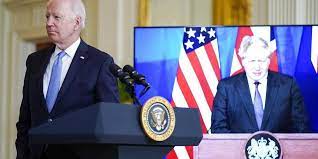London, Sept 16: A new trilateral defence and security partnership, agreed by the leaders of the UK, the US and Australia and dubbed as “landmark” to protect and defend shared interests in the strategically vital Indo-Pacific region, was launched with a joint televised address on Wednesday.
Under the so-called ‘AUKUS’ – Australia, UK and US – alliance, the three nations have agreed to enhance the development of joint capabilities and technology sharing, foster deeper integration of security and defence-related science, technology, industrial bases and supply chains.
The first initiative under AUKUS will be a collaboration on future nuclear-powered submarines for the Royal Australian Navy, a capability aimed at promoting stability in the Indo-Pacific region.
“The UK, Australia and US are natural allies – while we may be separated geographically, our interests and values are shared,” said British Prime Minister Boris Johnson, who joined US President Joe Biden and Australian Prime Minister Scott Morrison from Downing Street for the virtual address before a joint statement was released.
“The AUKUS alliance will bring us closer than ever, creating a new defence partnership and driving jobs and prosperity. This partnership will become increasingly vital for defending our interests in the Indo-Pacific region and, by extension, protecting our people back at home,” he said.
The agreement reflects the unique level of trust and cooperation between our three countries, who already share extensive intelligence through the Five Eyes alliance, Downing Street said.
“Recognising our deep defence ties, built over decades, today we also embark on further trilateral collaboration under AUKUS to enhance our joint capabilities and interoperability. These initial efforts will focus on cyber capabilities, artificial intelligence, quantum technologies, and additional undersea capabilities,” reads the joint statement issued by the leaders.
“Through AUKUS, our governments will strengthen the ability of each to support our security and defence interests, building on our longstanding and ongoing bilateral ties.
“We will promote deeper information and technology sharing. We will foster deeper integration of security and defence-related science, technology, industrial bases, and supply chains. And in particular, we will significantly deepen cooperation on a range of security and defence capabilities,” it adds.
The leaders said their new endeavour is aimed at helping sustain peace and stability in the Indo-Pacific region.
The initial scoping phase for the new alliance is expected to take 18 months. The UK said that as it has built and operated world-class nuclear-powered submarines for over 60 years, it will bring “deep expertise and experience” to the first project under AUKUS.
The UK and US, already leading members of NATO defence alliance, said the work done by AUKUS will support shared goals in new regions, promoting stability and protecting “our people against new and emerging threats”.
“As set out in the Integrated Review, the Indo-Pacific is at the centre of intensifying geopolitical competition with potential flashpoints including unresolved territorial disputes; to nuclear proliferation and miscalculation; to climate change and non-state threats from terrorism and Serious Organised Crime. It is on the frontline of new security challenges, including in cyberspace,” Downing Street said.
Highlighting this growing Indo-Pacific tilt, the UK government pointed to HMS Queen Elizabeth aircraft carrier’s deployment to the region alongside personnel and equipment from the US.
Last month, the Carrier Strike Group undertook a series of exercises with countries, including India and Australia, to build “interoperability with like-minded partners”, it said.
The evolving situation in the Indo-Pacific region in the wake of China’s increasing military muscle-flexing has become a major talking point among leading global powers. The US has been favouring making Quad a security architecture to check China’s growing assertiveness.
In November 2017, India, Japan, the US and Australia gave shape to the long-pending proposal of setting up the Quad to develop a new strategy to keep the critical sea routes in the Indo-Pacific free of any influence.
Beijing claims almost all of the 1.3 million square mile South China Sea as its sovereign territory. China has been building military bases on artificial islands in the region also claimed by Brunei, Malaysia, the Philippines, Taiwan and Vietnam.
China has built up and militarised many of the islands and reefs it controls in the region. Both maritime areas in the South and East China seas are stated to be rich in minerals, oil and other natural resources and are also vital to global trade. (PTI)
Trending Now
E-Paper


